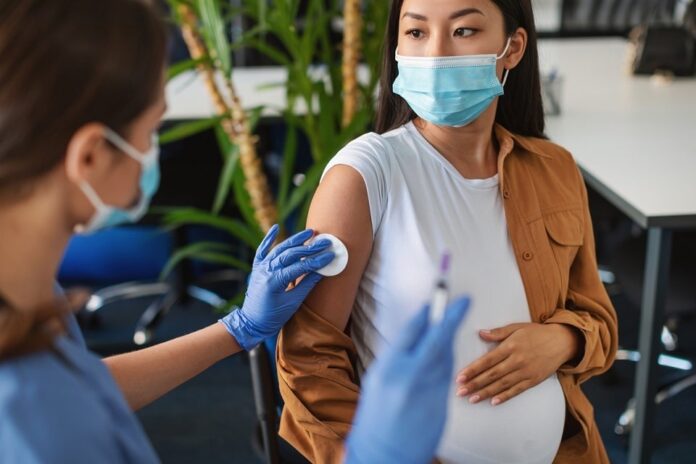A new study led by researchers at Swansea University has revealed that potentially only one in three pregnant women in Wales would actually have the Covid-19 vaccine during pregnancy, even though two in three said they would have the jab.
Vaccine hesitancy is an important consideration among vulnerable populations, such as pregnant women especially during the pandemic. The study, led by the Born in Wales team at the National Centre for Population Health & Wellbeing Research in collaboration with Bristol Medical School and Public Health Wales, aimed to:
Estimate Covid-19 vaccination rates among pregnant women in Wales and their association with age, ethnicity, and area of deprivation, using electronic health records data linkage; and,
Explore pregnant women’s views on receiving the Covid-19 vaccine during pregnancy using data from a survey recruiting via social media, through midwives, and posters in hospitals.
The study, published in the BMC Infectious Diseases, identified women living in Wales who were pregnant between April 13 and December 31, 2021, aged 18 or older, and eligible for Covid vaccination.
The team used the Secure Anonymised Information Linkage (SAIL) Databank, based at Swansea University, to bring together and examine GP, hospital admissions, the national
community child health, maternal indicators, and Covid vaccination data in Wales. SAIL Databank is an anonymised data repository that facilitates data linkage. Linking data allows researchers to bring together information from various resources to create a deeper understanding and quality of information to use in their research.
Separately, a cross-section of pregnant women in Wales were invited to complete an online survey asking their views about having the Covid vaccination during pregnancy, if they had already received, or intended to receive the vaccination during their pregnancies and the reasons for their decisions.
The main findings were:
32.7 per cent of women received at least one dose of the Covid vaccine during pregnancy;
34.1 per cent remained unvaccinated throughout the follow-up period;
33.2 per cent received the vaccine postpartum;
Younger women (aged under 30) and those living in areas of high deprivation were less likely to have the vaccine; and,
Asian and other ethnic groups were slightly more likely to have the vaccine in pregnancy compared with White group.
Main findings from the survey with pregnant women were:
69 per cent stated they would be happy to have the vaccine during pregnancy;
31 per cent indicated they would not have the vaccine during pregnancy;
Reasons for having the vaccine related to protecting self and baby, perceived risk level, and receipt of sufficient evidence and advice; and,
Reasons for vaccine refusal included lack of research about long-term outcomes for the baby, anxiety about vaccines, inconsistent advice/information, and preference to wait until after the pregnancy.
Lead author Dr Mohamed Mhereeg, Research Officer and Data Scientist at the Centre for Population Health, said: “Vaccinations protect against severe diseases. As the pandemic continues, booster vaccinations are increasingly important to provide protection against severe Covid-19, especially in vulnerable populations such as pregnant women.
“It is critical to develop tailored strategies to increase the acceptance rates of the Covid-19 vaccine and decrease hesitancy. A more targeted approach to vaccinations may need to be addressed to reach certain groups such as younger people, black and mixed ethnic minorities, and those living in more deprived areas. Encouraging vulnerable populations, including pregnant women is a priority moving forward.”
Professor Kieran Walshe, Director of Health and Care Research Wales said: “Research of this kind is crucial to deepening our understanding of people and the way they interact with the healthcare options available to them. Study findings help inform and support policy makers and healthcare providers to identify gaps in uptake, giving them the opportunity to find solutions that serve as many people as possible, particularly more vulnerable groups.”
The National Centre for Population Health and Wellbeing Research is funded by the Welsh Government through Health and Care Research Wales. This research was funded by the National Core Studies, an initiative funded by UKRI, NIHR and the Health and Safety Executive and was supported by HDR UK.
Help keep news FREE for our readers
Supporting your local community newspaper/online news outlet is crucial now more than ever. If you believe in independent journalism, then consider making a valuable contribution by making a one-time or monthly donation. We operate in rural areas where providing unbiased news can be challenging. Read More About Supporting The West Wales Chronicle
























